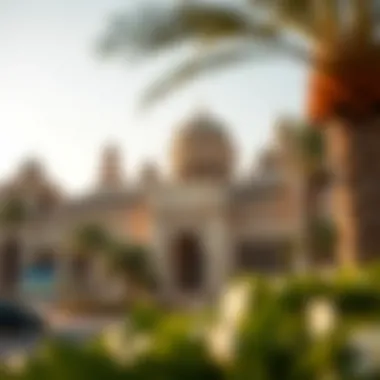April 2024 Holidays in the UAE: Significance and Impact


Intro
April 2024 is set to be a vibrant month in the UAE, marked by significant holidays that resonate deeply with the cultural fabric of the region. The celebration of these holidays not only reflects the traditions and values of the Emirati people but also plays a pivotal role in shaping market dynamics, particularly in real estate.
In this overview, we’ll take a closer look at how these holidays impact lifestyle choices and real estate activities. Understanding the connections between cultural observances and market trends is essential for homebuyers, investors, agents, and analysts alike. With a keen eye on the implications of these holidays, the reader can better navigate the fluctuating tides of the UAE's property market.
Let’s delve into the details of these upcoming holidays and explore their significance.
Overview of April Holidays in the UAE
April in the United Arab Emirates is a vibrant month filled with holidays that reflect the rich cultural heritage and religious traditions of the region. Understanding the significance of these holidays is important not only for residents but also for visitors, investors, and anyone looking to engage with UAE society. The essence of April holidays lies in their ability to bring people together and provide a respite from the daily grind.
Significance of Holidays in the UAE
Holidays in the UAE serve multiple purposes. They are a time for connection, celebration, and reflection. For Emiratis and expatriates alike, these days are often steeped in cultural importance and historical significance. The intricate tapestry of different cultures living in the UAE means that holidays often bring together a blend of traditions, showcasing the nation’s multicultural ethos. This is particularly true in April 2024, where significant observances like Eid al-Fitr will occur.
Beyond their cultural aspect, holidays foster a sense of community and belonging. Family gatherings become most cherished during these times, with many choosing to return home from abroad to participate in festivities. The holidays evoke a spirit of generosity and compassion, compelling many to engage in charity and community service.
Impact on Daily Life
The public holidays in April dramatically reshape the rhythm of everyday life in the UAE. Businesses, schools, and government offices often close for these observances, allowing people to partake in family and community activities freely. This shift not only affects work schedules but also dramatically influences consumer behavior.
For example, during holidays, there’s typically a surge in shopping and dining out. Restaurants and malls often prepare special events or promotions, aimed at attracting families out for celebration. Moreover, the transportation systems experience spikes in usage, with many traveling to popular destinations or family homes.
While holidays present opportunities for personal connection and recreation, they can also present challenges. For instance, traffic congestion may become an issue as people flock to celebrate with loved ones. Furthermore, the excitement of the holidays can create fluctuations in daily routines that may require individuals and families to adapt their schedules accordingly.
In summary, the April holidays in the UAE showcase the country's cultural diversity and hold profound significance for its people. By grasping both the significance and impact of these holidays, we can gain better insights into the societal fabric of the UAE.
Public Holidays in April
Public holidays in April 2024 are a vibrant reflection of the cultural tapestry within the UAE. These observances not only mark significant historical and religious events but also impact social behaviors, economic patterns, and community bonding. Understanding these holidays is crucial for anyone looking to navigate life in the UAE, whether for personal enjoyment or business opportunities.
Eid al-Fitr Celebration
Eid al-Fitr stands out as a major public holiday in April, celebrated at the conclusion of Ramadan. This festival carries paramount importance, representing joy, gratitude, and togetherness amongst families and communities
Historical Context
Eid al-Fitr traces its roots to the teachings of the Prophet Muhammad, who encouraged communal prayer and charity. This historical foundation infuses the celebration with a profound sense of unity. The holiday underscores the novelty of charity and community as a cornerstone of Islamic teachings.
The uniqueness of Eid al-Fitr lies in its timing, which shifts based on the moon's sighting, adding an air of anticipation and excitement every year. This dynamism gives an unpredictable charm that keeps people engaged. Plus, it encourages a spirit of keen observation.
Cultural Traditions
During Eid al-Fitr, one can expect rich cultural practices. These range from communal prayers in mosques to lavish meals and the exchange of gifts. In many households, traditional dishes like biryani and sweets like maamoul take center stage, enabling families to bond over shared culinary experiences.
Additionally, wearing new clothes symbolizes renewed faith and joy, enhancing the festive ambiance. These customs highlight the communal ethos, which fits perfectly with the theme of family and society in the article.
Date and Duration


Eid al-Fitr in 2024 is projected to start on the evening of April 10 and last for several days, marking a substantial break from the rigor of Ramadan. This specific timing allows for a seamless transition from fasting to festive celebrations. Such extended observance encourages travel, family reunions, and a spike in local commerce as businesses cater to holiday needs.
Arafat Day Observance
Following Eid, Arafat Day is often marked by reflection and solemnity, laying the groundwork for the Hajj pilgrimage. This day holds significant spiritual weight, reminding the faithful of humility and devotion.
Religious Significance
The essence of Arafat Day is grounded in its pivotal role during Hajj. It symbolizes the day when pilgrims stand at a place called Arafat, engaging in deep prayer and supplication. This act embodies devotion and a connection to something greater than oneself.
The observance offers a reminder for non-pilgrims as well, encouraging reflection on one's life and the broader implications of faith. This aligns with the article's goals, shedding light on the multifaceted nature of holidays in UAE society.
Related Traditions
Traditions associated with Arafat Day may include fasting, prayer, and community gatherings. Families often share meals with each other or engage in charitable acts on this day, aligning closely with the spirit of giving inherent to Islamic teachings. This communal approach underlies the deeper social dynamics during holiday observances, enhancing overall cohesion in society.
The unique aspect of these gatherings is their ability to reinforce familial and community ties, further enriching the cultural engagement discussed earlier in the article. Through these observances, Arafat serves as a bridge for spiritual growth and community connection among those who partake.
Holiday Dynamics in UAE Society
The dynamics of holidays in the UAE extend beyond mere celebrations; they reflect the intricate tapestry of societal values, cultural identity, and economic shifts. These holidays act as mirror, giving us a glimpse into the deeply rooted traditions and also the evolving social fabric of the nation. They serve multiple facets - enriching personal lives, fostering community bonds, and stimulating the economy, particularly in areas like tourism and real estate.
Family and Community Gatherings
In the context of family and community, holidays in the UAE are pivotal. During these periods, families often come together, bridging distances and reinforcing social ties. The atmosphere is abound with the aroma of traditional dishes being prepared, providing a deeper understanding of cultural heritage. For instance, meals during Eid al-Fitr not just satiate hunger but symbolize unity and shared joy.
The genuine warmth involved in such gatherings promotes not only familial connections but also nurtures the spirit of community. Everyone from the young kids to the elderly participate, enhancing intergenerational relationships. Indeed, holidays are a time where traditions are honored, stories are shared, and relationships are strengthened.
Tourism and Hospitality Trends
Visitor Influx
The influx of visitors during holidays is a striking characteristic that illustrates the UAE's growth as an international hub. Observing these holiday periods, one can see the streets bustling with tourists, allured by the rich tapestry of experiences the UAE offers during this vibrant season. The result is a notable spike in economic activity, particularly in tourism and retail sectors.
- Economic Boost: Hotels, restaurants, and entertainment venues see a significant rise in patronage, which helps sustain jobs and drive revenues.
- Cultural Exchange: The diverse crowd promotes cultural exchange and understanding, enriching the overall atmosphere.
- Infrastructure Use: This visitor influx also tests the efficiency and confines of existing infrastructure, necessitating ongoing development projects.
All these aspects make visitor influx not just a seasonal event, but a vital cog in the UAE's economic machine.
Event Planning
On the flip side, the intricacies of event planning during holidays cannot be overlooked. Venues across the UAE start buzzing weeks in advance, with planners curating memorable experiences that reflect the spirit of the festivities.
- Diverse Offerings: From large family dinners to cultural performances, the array is vast and caters to different interests, providing wide scopes for businesses.
- Local Talent Showcased: Event planning also highlights local talent, showcasing performances and exhibitions that resonate with national identity.
- Logistical Challenges: However, this surge in activity can lead to challenges in logistics and operational management, as service providers strive to meet high expectations.
This aspect of event planning plays a pivotal role in shaping holiday experiences, offering both opportunities and challenges intertwined with the celebratory nature of April holidays in the UAE.
In essence, the holiday dynamics in UAE society weave together family bonding, cultural exchange, and economic exuberance, making them a critical part of the region's identity and progress.
Market Implications of April Holidays


Understanding the market implications of holidays in the UAE is crucial, especially in April 2024. These holidays not only stir up celebrations but also have concrete effects on various sectors like real estate and tourism. With the influx of visitors and the cultural significance these holidays hold, businesses and investors need to navigate through what can be a profitable yet competitive landscape. This section will delve into how the holidays impact real estate activity and property investment trends.
Real Estate Activity
Increase in Transactions
With the advent of April holidays, especially Eid al-Fitr, the UAE often sees a notable spike in transaction volumes within the real estate market. This can be attributed to the fact that many expatriates and locals look for investment opportunities or even second homes during this time. The enthusiasm around festivities tends to fuel a general sense of optimism in the property sector, leading to an uptick in buying and selling activities.
Importantly, this period marks a key time for developers and agents to showcase properties that might be appealing for families or individuals looking to settle during the celebratory season. People often wish to relocate or invest right before the holidays to leverage the bustling environment, making it a prime time for transactions. It’s essential to note that the strategies employed during this season can be quite unique. Sellers might offer limited-time deals or special promotions, aiming to capitalize on the increased traffic in the market.
However, while there is potential for greater volume, these transactions are subject to fluctuations in market confidence and economic conditions. As some buyers might be deterred by high prices or interest rates, a careful approach is required to ensure success.
Rental Demand Fluctuations
The rental market is equally affected during the holidays. Typically, there’s a noticeable fluctuation in demand. As many people travel to their home countries during Ramadan and Eid, the demand for short-term rentals can actually decrease. In contrast, some areas that cater to tourists may see an uptick in short-term leases as visitors flood in to enjoy the festive atmosphere.
Property owners should be sensitive to these movements. It could be beneficial to adapt leasing strategies in anticipation of these shifts. For example, landlords might want to consider offering competitive pricing during the months leading up to the holidays to attract renters who may not have plans to travel.
Another unique feature of this fluctuation is the increased emphasis on community-driven events and amenities. Buildings that offer communal areas or host events can attract more attention, as tenants may be interested in enjoying the festive spirit in a social setting.
Impact on Property Investment
Shifts in Investment Strategies
April holidays prompt investors to reconsider their strategies. The festive period can be prime for re-evaluating portfolios and exploring new opportunities. Many realize there may be limited-time openings for properties at competitive prices or in previously overlooked locations. Investors often capitalize on existing market sentiments to adapt their strategies, targeting emerging areas where rental yields are projected to rise.
Also, the demand for sustainable and family-friendly developments can shift proactively as well, reflecting consumer preferences during festive times. The result is a more nuanced approach where investors balance emotional and rational decision-making. Such shifts enable them to stay ahead of trends and align their portfolios with predicted market movements.
Focus on Prime Locations
When discussing property investment during April, the focus on prime locations cannot be overlooked. This holiday season often sees increased interest in affluent neighborhoods that are known for their amenities and proximity to cultural hotspots. Areas such as Downtown Dubai and Abu Dhabi’s Corniche exemplify how location plays a pivotal role in investment decisions around this time.
Investors who target these prime locations stand to benefit from increased rental demand, particularly from families looking for temporary accommodations during holiday festivities. A considerable advantage of investing in such preferred areas includes higher liquidity. Properties tend to retain or even increase value due to their desirability, particularly during high-demand seasons.
In summary, the April holidays in the UAE serve as a turning point for market dynamics — highlighting opportunities while presenting challenges unique to the time. Staying informed and being adaptable can significantly influence the outcomes for both residential and commercial real estate investments, ultimately shaping the strategic decisions of buyers and investors alike.
Cultural Practices during Holidays
Cultural practices during holidays in the UAE are not just mere traditions; they are the fabric that stitches together the rich and diverse heritage of the nation. These activities foster a sense of community, strengthen family bonds, and provide an opportunity for joyous gatherings. The way holidays are celebrated showcases the unique blend of customs that reflect both Islamic teachings and local influences. Understanding these practices gives valuable insight into the heart of Emirati society, making the exploration of holidays a meaningful subject for every stakeholder involved in the region, especially homebuyers and investors.
Food and Festivities
Traditional Dishes
When one speaks of traditional dishes during holidays, the conversation invariably circles around culinary marvels that are steeped in history and cultural significance. A key characteristic of these dishes is their ability to bring families together around the table, creating a warm and inviting atmosphere. Dishes such as Machboos, a spiced rice dish often served with chicken or fish, exemplify how food can act as a communal bond. These meals are not just food; they are experiences that highlight familial ties and cultural heritage.
One unique feature of traditional dishes is their preparation methods, often passed down through generations. This not only adds to their flavor but also carries with it stories and memories that enrich the dining experience. While traditional dishes can be time-consuming to prepare, the rich flavor and cultural symbolism they present more than make up for it. They serve as a valuable way for residents and visitors alike to engage meaningfully with Emirati culture.
Feasting Rituals


Feasting rituals during holidays serve as a grand celebration of life and community spirit. These gatherings are often marked by specific timing, commonly during evening meals, where families come together to break bread and share in the blessings of the season. A defining characteristic of these rituals is the sense of unity and togetherness they foster. It’s a time when the bustle of daily life takes a backseat, allowing individuals to indulge in the joy of companionship.
The unique feature of these feasting rituals lies in the shared experience they provide. While they can sometimes lead to overindulgence and waste, the overarching theme is one of generosity and hospitality. Meals are plentiful, and dishes are often exchanged among neighbors, which further cultivates a sense of community. Feasting becomes more than just a meal; it's a practice embedded in the very identity of UAE's social fabric.
Art and Entertainment
Local Festivals
Local festivals during holidays reflect the vibrant tapestry of UAE’s cultural landscape. They take place throughout April, punctuating the month with lively activities and gatherings. These festivals are characterized by an array of artistic expressions ranging from traditional music to contemporary art exhibitions. They act as platforms for local artists, giving them a stage to showcase their talents while simultaneously educating the public about cultural heritage.
By participating in local festivals, there’s an opportunity for both Emiratis and visitors to experience cultural immersion unlike anything else. The unique feature of these festivals is their ability to blend the old with the new, presenting modern interpretations of traditional practices. Although these festivities often draw large crowds, thus bringing challenges such as crowd management, their impact on community spirit is immense, laying a foundation for cultural appreciation and respect.
Cultural Performances
Cultural performances during holidays are emblematic of the UAE’s deep appreciation for the arts. They include everything from traditional dance to musical concerts, offering an engaging way to experience Emirati culture first-hand. A hallmark of these performances is their vibrancy and expressiveness, which serve to invigorate both participants and audiences.
These performances are an opportunity for storytelling, sharing tales that connect the present generation with their ancestors. The unique feature is that they often take place in public spaces, making them accessible to all. However, while artistic presentations can enhance cultural dialogue, they may also raise questions about preserving authenticity in the face of globalization. Regardless, the joy and pride they instill in the community are unmistakable, making them a cornerstone of holiday celebrations in the UAE.
"Cultural practices during holidays are more than festive activities; they're a means of preserving identity and fostering communal ties in the UAE."
Ultimately, engaging with these practices, whether through the lens of a homebuyer, investor, or just a curious observer, enriches the understanding of what defines life during holidays in this dynamic region.
Future Outlook for Post-Holidays
As we look to the horizon beyond the April holidays in the UAE, it's crucial to consider the implications that these festive periods have on various sectors, particularly the economy and real estate. The connections forged during holiday celebrations—whether through family gatherings or public festivities—often set the stage for future interactions and financial decisions. The aftermath of holidays like Eid al-Fitr brings both opportunities and challenges that stakeholders in real estate and the economy must navigate carefully.
Economic Recovery Impact
The economic landscape in the UAE is significantly influenced by the holidays. These periods usually see a spike in spending, with families and friends gathering to celebrate, which in turn boosts local businesses. This burst of consumer activity can be pivotal for economic recovery, especially following any downturn. For instance, during and after Eid al-Fitr, there tends to be increased spending on goods and services, from food to entertainment. The bounce-back is not just temporary; it dares to lay down a pattern of sustained growth in economic confidence.
However, this is a double-edged sword. Companies, especially in tourism and hospitality, must strategize effectively to maintain that momentum. A strong post-holiday season relies on the balance of supply and demand. If product availability doesn't match the surge of buyer enthusiasm, it can lead to dissatisfaction, impacting future sales. Keeping an agile mindset is key for businesses eager to capitalize on consumer sentiment.
Sustained Growth in Real Estate
The real estate sector often mirrors economic health. When people are feeling good about their finances during holidays, it tends to translate into more purchases or rental inquiries. In the aftermath of the April holidays, we can anticipate observable trends in the property market. The demand for housing, especially in desirable areas, tends to spike following festive seasons. This is not purely anecdotal; many investors look at the holiday period as an opportune time for assessing market conditions.
Factors that could influence sustained growth in real estate include:
- Increased Interest in Property Investments: Homebuyers and investors may feel more optimistic post-holiday, leading to increased inquiries and transactions in the market.
- Focus on Family Living Arrangements: As families gather during the holidays, many contemplate their living conditions. This often prompts a desire for more space or a better location—fuels the market's demand for certain property types.
- Economic Indicators Post-Holiday: Tracking economic indicators such as job growth and wage increases post-holidays will help investors and analysts gauge whether the market is accelerating or merely experiencing a temporary uptick.
"In the aftermath of celebrations like Eid al-Fitr, the pulse of the real estate sector quickens, paving the way for potential growth opportunities."
Embracing these trends with foresight can equip homebuyers, investors, and real estate agents with the clarity they need to make sound decisions. As we move further into 2024, the balance between consumer sentiment, economic indicators, and investment opportunities will be essential in shaping the future of the UAE’s property landscape.
Culmination
The holidays gathered within the month of April 2024 in the UAE beckon not only a celebration of cultural richness but also serve as a significant pulse within the country’s social and economic framework. Understanding the intricacies of these holidays is essential for various stakeholders, be it homebuyers, investors, or analysts seeking to capitalize on local trends.
Recap of Significance
In essence, these holidays are more than mere time off from work; they embody the heritage and social fabric of UAE society. The observance of festivals like Eid al-Fitr demonstrates a communal spirit, bringing families and friends together. The influx of tourists during this period contributes significantly to the economy, particularly in sectors such as hospitality and retail. Thinking practically, homebuyers and investors find themselves at a crossroads of opportunity, as property values often sway with the holiday seasons. Awareness of these rhythms can help in making informed decisions, whether one is looking for investment or a place to call home.
Final Thoughts on April Holidays in UAE
As we delve into the essence of April holidays in the UAE, it becomes clear these events are woven into the daily lives of residents. They signify a deep-rooted respect for tradition while also embracing modernity and its influence on the real estate market.
These holidays are indicative of a broader narrative, where cultural appreciation meets economic opportunity. For anyone involved in property or tourism, acknowledging these elements is crucial. The lessons gleaned from this examination can guide strategic moves, ultimately fostering a richer engagement with the dynamic landscape of the UAE. In a rapidly evolving market, it pays to keep one’s ears to the ground during these hallmark times.



